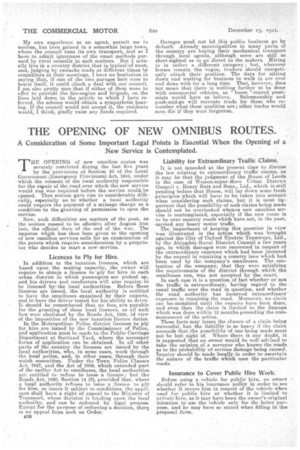THE OPENING OF NEW OMNIBUS ROUTES.
Page 28

If you've noticed an error in this article please click here to report it so we can fix it.
A Consideration of Some Important Legal Points is Essential When the Opening of a New Service is Contemplated.
THE OPENING of new omnibus routes was severely restricted during the last five years by the provisions of Section 20 of the Local Government (Emergency Provisions) Act, 1916, under which the consent of the local authority responsible for the repair of the road over which the new service would run was required before the service coulck be opened. That section gave rise to considerable difficulty, especially as to whether a local authority could require the payment of a mileage charge as a condition to the granting of permission to open the service.
Now, such difficulties are matters of the past, as the section ceased to be effective after August 31st last, the official date of the end of the war. The impetus which has thus been given to the opening of new omnibus services calls for an examination of the pointswhich require consideration by a proprietor who decides to start a new service.
Licences to Ply for Hire.
In addition to the taxation licences, which are based upon the seating capacity, the owner will require to obtain a licence to -ply for hire in each urban district in which passengers: are picked up, and his drivers and conductors will also require to be licensed by' the local authorities. Before these licences are issued, the local authority is entitled to have the omnibuses examined by their experts, and to have the driver tested for his ability to drive. It should be remembered that no fees, are payable for the granting of these local licences, as all such fees were abolished by the Roads Act, 1920, id' view of the imposition of the new taxation licence duties.
In the Metropolitan Police district licences to ply for hire are issued by the Commissioner of Police, and application must be made to the Public Carriage Department at Scotland Yard, where the necessary forms of application can be obtained. In all other parts of the country the licenceFr are issued by the local authorities, who, in some cases, work through the local police, and, in other eases, through their watch committee. Under the Town Police Clauses Act, 1847, and the Act of 1889. which extended part of the earlier Act to omnibuses, the local authorities are entitled to refuse to issue a licence ; but the Roads Act, 1920, Section 14 (3), provided that, where a local authority refuses to issue a licence to ply for hire, or issues it subject to conditions, the applicant shall have a, right of appeal to the Ministry of Transport, whose decision is binding upon the local authority, and can be enforced by legal process. Except for the purpose of enforcing a decision, there is no appeal from such an Order.
Liability for 'Extraordinary Traffic Claims.
It is not intended at the present time to discuss the law relating to extraordinary traffic claims, as it may be that the judgment of the House of Lords in the case of Weston-super-Mare Urban District Council v. Henry Butt and Sons. Ltd., which is still pending before that House, will fay down some fresh principles which will have to be taken into account when considering such claims, but it is most ireportant that the possibility of such claims being made should not be overlooked whenea new omnibus sers vice is contemplated, especially if the new route is to be over country roads which have not, in the past, ceareied any heavy motor traffic.
The -importance of keeping this question in view was illustrated in the action which was brought against the City of Oxford Electric Tramways, Ltd., by the Abingdon,Rural District -Council a few years ago, in which damages were recovered in respect of the extraordinary expenses which had been incurred by the council in repairing a country lane which had been used •bv the company's omnibuses. The contention of the company, that they were satisfying the requirements of the district through which the omnibuses ran, was not accepted by the court.
In each case it is a question of fact whether or not the traffic is extraordinary, having regard to the usual traffic over the road in question, and whether the road authority has incurred extraordinary expenses in repairing the road. Moreover, no claim can be sustained until the repairs have been done, and even then the claim is limited to the damage which was done within 12 months preceding the commencement of the action.
These facts may lessen the chance of a claim being successful, but the liability is so heavy if the claim succeeds that the possibility of one being made must not be lost sight of. Where there is any doubt, it is suggested that an owner would be well advised to take the opinion of a surveyor who knows the roads as to the probability of serious damage being caused. Inquiry should he made locally in order to ascertain the nature of the traffic which uses the particular roads.
Insurance to Cover Public Hire Work.
Before using a vehicle for public hire, an owner should refer to his insurance policy in order to see whether it covers him in respect of the vehicle when used for public hire or whether it is limited to Private hire, as it may have been the owner's original intention to use the vehicle only for the latter purpose, and he may have so stated when filling in the proposal form.
































